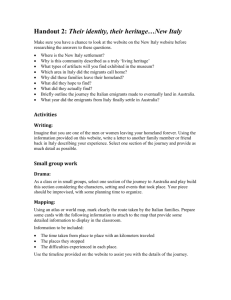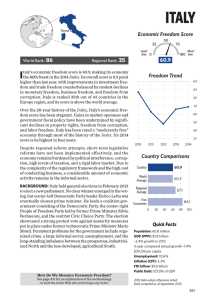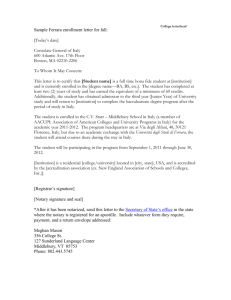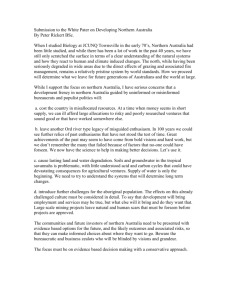ITALY - SPEECH BY THE PRESIDENT OF THE COUNCIL OF
advertisement
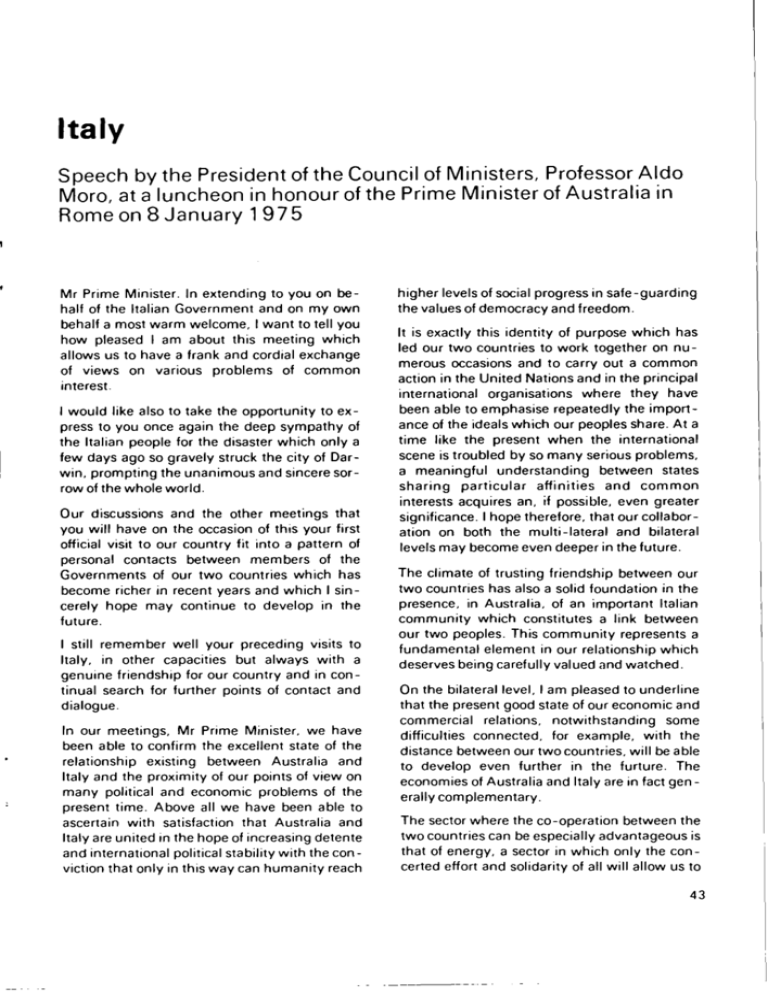
Italy Speech by the President of the Council of Ministers, Professor Aldo Moro, at a luncheon in honour of the Prime Minister of Australia in Romeon 8January 1975 Mr Prime Minister. In extending to you on behalf of the Italian Government and on my own behalf a most warm welcome, I want to tell you how pleased I am about this meeting which allows us to have a frank and cordial exchange of views on various problems of common interest. I would like also to take the opportunity to express to you once again the deep sympathy of the Italian people for the disaster which only a few days ago so gravely struck the city of Darwin, prompting the unanimous and sincere sorrow of the whole world. Our discussions and the other meetings that you will have on the occasion of this your first official visit to our country fit into a pattern of personal contacts between members of the Governments of our two countries which has become richer in recent years and which I sincerely hope may continue to develop in the future. I still remember well your preceding visits to Italy, in other capacities but always with a genuine friendship for our country and in continual search for further points of contact and dialogue. In our meetings, Mr Prime Minister, we have been able to confirm the excellent state of the relationship existing between Australia and Italy and the proximity of our points of view on many political and economic problems of the present time. Above all we have been able to ascertain with satisfaction that Australia and Italy are united in the hope of increasing detente and international political stability with the conviction that only in this way can humanity reach higher levels of social progress in safe-guarding the values of democracy and freedom. It is exactly this identity of purpose which has led our two countries to work together on numerous occasions and to carry out a common action in the United Nations and in the principal international organisations where they have been able to emphasise repeatedly the importance of the ideals which our peoples share. At a time like the present when the international scene is troubled by so many serious problems, a meaningful understanding between states sharing particular affinities and common interests acquires an, if possible, even greater significance. I hope therefore, that our collaboration on both the multi-lateral and bilateral levels may become even deeper in the future. The climate of trusting friendship between our two countries has also a solid foundation in the presence, in Australia, of an important Italian community which constitutes a link between our two peoples. This community represents a fundamental element in our relationship which deserves being carefully valued and watched. On the bilateral level, I am pleased to underline that the present good state of our economic and commercial relations, notwithstanding some difficulties connected, for example, with the distance between our two countries, will be able to develop even further in the furture. The economies of Australia and Italy are in fact gen erally complementary. The sector where the co-operation between the two countries can be especially advantageous is that of energy, a sector in which only the concerted effort and solidarity of all will allow us to face up the difficulties of the present time. In this context, the contribution which Australia can give to Italy, in the development of those alternative sources of energy on which the economic and social progress of our two peoples will increasingly depend, assumes particular importance. Mr Prime Minister, the desire to contribute to the solution of the great problems of our time which unites Australia and Italy also guarantees the expansion of our relations and closer human and cultural contacts between our two peoples. The Prime Minister signs the Cultural Agreement between Italy and Australia with the Prime Minister of Italy, Professor Moro. Speech by the Prime Minister of Australia at a luncheon given in his honour by the President of the Council of Ministers in Rome on 8 January 1975 It is a particular pleasure to be in Rome again. I was here for a day in April 1973, but this is my first official visit since becoming Prime Minister. I am visiting a number of the EEC countries and other European countries. The Community is now Australia's second largest trading partner. Europe, moreover, is the foundation of Australia's cultural heritage. The advanced state of European technology and culture make it imperative for leaders to keep in touch with events in Italy. It is therefore an important duty, as well as a special pleasure, to be with you. I doubt if there has ever been a time when consultation and co-operation between national leaders was more urgent or important. Australia and Italy have great cultural and social traditions in common: more significantly, we share with all countries of the Western world great social and economic problems. Inflation and unemployment pose a grave and growing threat to democratic values and social order and cohesion. If Western nations are to solve these problems without a recourse to authoritarianism or without a relapse into anarchy, they will do so only by restoring faith in the democratic system. I believe it is time for governments, for politicians, for all free political parties, to renew their commitment to the forms and values of a democratic society. There is no more urgent task for modern statesmen than to lead, to inspire, to nourish this commitment. The breakdown of democracy in one country, attacks on democracy in one country, must be recognised as an attack on democracy everywhere. I believe the leaders and peoples of Italy and Australia, two nations with democratic systems, can play a part in rebuilding the world's faith in the flexibility and strength of democracy. The Italian community is now the biggest of the national groups in Australia. More than 380,000 Australian residents were born in Italy, and Italians have had a profound impact on Australia's way of life. Many of our major developmental projects since the last war would have been impossible without Italian workers and engineers. Your great state enterprises, such as IRI and ENI, have been an example and an inspiration to me and my Government in the work we are doing. I mention one matter of great interest to Italy-the sale of Australian uranium. The Australian Government recognises the importance of uranium to Italy. We will ensure that Italy gets an equitable proportionalong with our other major trading partners-of the uranium we have to export. I am grateful for the welcome you have given me and for the valuable talks we are having together. There are important bilateral issues between our countries, but the most urgent and enduring interests we have in common encompass a wider field-a closely shared and deeply felt commitment to the ideals of peace, security and rising living standards for all peoples. Perhaps we will come to see that higher living standards do not necessarily mean-and can no longer mean-more material goods. For many nations, expectations of greater prosperity of this kind have had to be postponed. Whether they will be restored depends, I believe, on the restoration of faith in the democratic order, of confidence in our society and in ourselves. For my part, I believe the world will overcome its present problems. I am confident that in the meantime the cultural, and indeed the spiritual, traditions of Italy and her people will help sustain mankind in its adjustment to a new social order, to a new scale of human values, that will be more just, more humane, more generous and more selfless than those we have known before. a F- -n T me 7 President Tito and Madame Tito welcome MrWhitlam.
